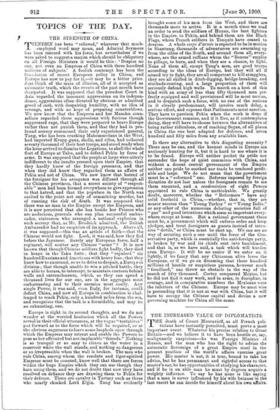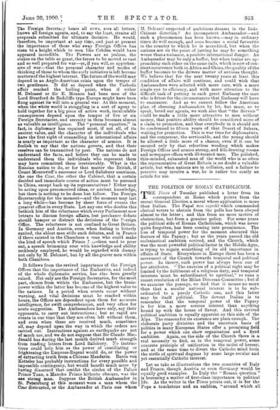THE INCREASED VALUE OF DIPLOMATISTS.
Fr HE death of Count Mouravieff, as all French poli- ticians have instantly perceived, must prove a most important event. Whatever his precise relation to Great Britain—and we believe it to have been hostile or, Say, malignantly suspicious—he was Foreign Minister of Russia, and the man who has the right to advise the autocratic Sovereign of a great Empire must in the present position of the world's affairs exercise great power. His master is not, it is true, bound to take. his advice, but he has permanent and rightful access to that Waster's ear, he has opportunities of studying his character, and if he is an: able man he must by degrees acquire a weighty influence. To say he has none is like saying that a man is never influenced by his- Wife beeause-in the last resort he can decide for himself about his Own affairs. The Foreign Secretary hears all news, sees all letters, knows all foreign agents, and, to say the least, strains all proposals submitted for ultimate decision. He would, therefore, be important at any time, and just at present the importance of those who sway Foreign Offices has risen to a height which to men like Cobden would have appeared incredible. The Powers are so jealous, the stakes on the table so great, the forces to be moved so vast and so well prepared for war—or, if you will, so apprehen- sive of war—that the personal character and modes of thinking of those to whom the early initiative is left become matters of the highest interest. The future of the world may depend in an Anglo-American crisis upon the temper of two gentlemen. It did so depend when the Fashoda affair reached the boiling point, when if either M. De'cease or Sir E. Monson had been men of the Lord Stratford de Redcliffe type Europe might have been flung against its will into a general war. At this moment, when the white world is struggling in a sort of agony to hold together for a.big piece of active work, incalculable consequences depend upon the temper of five or six Foreign Secretaries, and serenity in them becomes almost as valuable as intelligence. The "personal equation," in fact, in diplomacy as regained most, if not all, of its ancient value, and the character of the individuals who have the first right of counselling in international affairs is nearly as important as the character of armies. It is foolish to say that the nations govern, and that their resolves can be transmitted by post. The nations do not understand the facts, and before they can be made to understand them the individuals who represent them may have committed them irretrievably. What is the Russian nation to do, or for that matter the British, if Count Mouravieff's successor or Lord Salisbury convinces, the one the Czar, the other the Cabinet, that a certain decided and immediate course of action must be pursued in China, except back up its representatives ? Either may be acting upon preconceived ideas, or ancient knowledge, but there is nothing to be done but follow. The Foreign Secretaryship for the moment—and the moment may last a long while—has become by • sheer force of events the greatest office in every State. Let any one who doubts this bethink him of the reluctance which every Parliament now betrays to discuss foreign affairs, lest perchance debate should hamper or distract the decisions of the Foreign Office. The reluctance is not confined to Great Britain. In Germany and Austria, even when feeling is bitterly excited, the ablest men stifle such debates, and in France if there existed in the Chambers a man who could make the kind of speech which Prince r. i.poleon used to pour out, a speech brimming over with knowledge and ability recklessly employed, he would. be regarded with dismay not only by M. Delcasse, but by all the graver men within both Chambers.
It follows from the revived importance of the Foreign Offices that the importance of the Embassies, and indeed of the whole diplomatic service, has also been greatly raised. Not only are the Foreign Secretaries, for the most part, chosen from within the Embassies, but the brain- power within the latter has become of the highest value to the nations. In a period when events occur without warning, and vital decisions must be reached within hours, the Offices are dependent upon them for accurate intelligence, for swift comprehension, and very often for acute suggestion. The Ambassadors have only, say their opponents, to carry out instructions ; but so rapid are events in our time that they are often left without them, and even when these are received much, sometimes all, may depend upon the way in which the orders are carried out. Instructions against an earthquake are not of much use, and we do not suppose that Sir Claude Mac- donald has during the last month derived much strength from reading letters from Lord Salisbury. No instruc- tions could help him as the power of conciliating or frightening the Empress-Regent would do, or the power of extracting truth from a. Chinese Mandarin. Baron von Ketteler has probably instructions for every possible and impossible contingency, but would benefit much more by having discerned that amidst the circles of the Palace Prince Tux, a Manchu Prince hitherto obscure, was the one strong man. Suppose the British Ambassador in St. Petersburg at this moment were a man whom the Czar distrusted, or the Ambassador at Paris one whom M. Delcasse suspected of ambitious dreams in the Lido- Chinese direction ? An incompetent Ambassador—and such a phenomenon has been known—may in ordinary times do well enough, and even become a social favourite in the country to which he is accredited, but when the nations are on the point of jarring he may be something worse thane nuisance, a positive international danger. An Ambassador may be only a buffer, but when trains are ap- proaching each other on the same rails, which is now of con- stant occurrence both in Africa and China, the quality of the buffer becomes to the drivers matter of anxious thought. We believe that for the next twenty years at least this condition of affairs will continue, and could wish that Ambassadors were selected with more care, with a mere single eye to efficiency, and with more attention to the difficult task of putting in each great Embassy the man who is fittest for the circumstances that Embassy will have to encounter. And as we cannot follow the American plan of choosing Ambassadors by lot, but must, so to speak, breed our agents, we wish also that "the Service" could be made a little more attractive to men without money, that positive ability should be considered more of a claim to promotion, and that everybody in it should not be condemned to fif teen years of that Desert of Sahara, waiting for promotion. This is war time for diplomatists, and the competent, the serviceable, and the young should be allowed a little more of a chance, even if it can be secured only by that relentless weeding which makes Foreign Offices and armies strong, and fills drawing rooms and newspaper offices with ill-treated men. The polished, thin-minded, exhausted man of the world who is so often the representative of Great Britain is no doubt a valuable article, but when nations are in collision, and a failure to perceive may involve a war, he is rather too costly an article for use.



















































 Previous page
Previous page